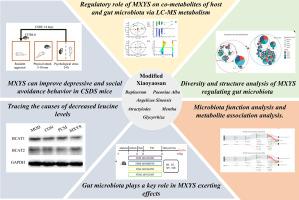Modified Xiaoyaosan rescues depression-like behavior via remodeling gut microbiota and leucine metabolism
IF 8.3
1区 医学
Q1 CHEMISTRY, MEDICINAL
引用次数: 0
Abstract
Background
Social avoidance is a hallmark symptom of depression. Although Modified Xiaoyaosan (MXYS) has been reported to attenuate this behavior, the underlying mechanisms remain poorly understood.
Purpose
This study aimed to investigate the mechanisms by which MXYS alleviates social avoidance, with particular emphasis on gut microbiota composition and leucine metabolism.
Methods
A chronic social defeat stress (CSDS) mouse model was established to evaluate the antidepressant effects of MXYS. Fecal samples were subjected to LC–MS-based untargeted metabolomics and 16S rRNA sequencing to characterize alterations in gut microbiota and metabolites. Fecal microbiota transplantation (FMT) was conducted to verify the contribution of gut microbes to MXYS’s antidepressant effects. Furthermore, targeted GC–MS, LC–MS/MS, and Western blotting analyses were employed to elucidate the mechanisms underlying leucine reduction. Finally, exogenous leucine supplementation was administered to determine its potential antidepressant efficacy.
Results
MXYS treatment significantly ameliorated CSDS-induced social avoidance and other depression-like behaviors. Integrated metabolomic and 16S rRNA analyses identified leucine metabolism as a potential therapeutic target. MXYS modulated gut microbial composition and functional pathways, particularly those involved in leucine metabolism. FMT experiments confirmed the essential role of gut microbiota in mediating the antidepressant effects of MXYS. Targeted metabolic profiling and protein expression analyses revealed that enhanced microbial degradation of leucine contributed to its systemic reduction. Moreover, leucine supplementation robustly reversed depressive-like behaviors and attenuated hippocampal oxidative stress.
Conclusion
MXYS alleviates social avoidance in CSDS mice by modulating gut microbiota–mediated leucine degradation, thereby restoring systemic leucine levels and improving hippocampal oxidative stress.

改良的消药散通过重塑肠道菌群和亮氨酸代谢来拯救抑郁样行为
社交回避是抑郁症的一个标志性症状。虽然改良的消药散(MXYS)已被报道可以减轻这种行为,但其潜在的机制尚不清楚。目的本研究旨在探讨MXYS缓解社交回避的机制,重点关注肠道菌群组成和亮氨酸代谢。方法建立慢性社会失败应激(CSDS)小鼠模型,评价MXYS的抗抑郁作用。对粪便样本进行基于lc - ms的非靶向代谢组学和16S rRNA测序,以表征肠道微生物群和代谢物的变化。通过粪便菌群移植(FMT)验证肠道微生物对MXYS抗抑郁作用的贡献。此外,采用靶向GC-MS、LC-MS /MS和Western blotting分析来阐明亮氨酸减少的机制。最后,使用外源性亮氨酸补充剂来确定其潜在的抗抑郁功效。结果smxys治疗可显著改善csds诱导的社交回避及其他抑郁样行为。综合代谢组学和16S rRNA分析发现亮氨酸代谢是潜在的治疗靶点。MXYS调节肠道微生物组成和功能途径,特别是那些涉及亮氨酸代谢。FMT实验证实了肠道菌群在介导MXYS抗抑郁作用中的重要作用。有针对性的代谢分析和蛋白质表达分析表明,微生物对亮氨酸的降解增强有助于其系统性减少。此外,补充亮氨酸可以有效地逆转抑郁样行为并减轻海马氧化应激。结论mxys通过调节肠道菌群介导的亮氨酸降解来缓解CSDS小鼠的社交回避,从而恢复全身亮氨酸水平,改善海马氧化应激。
本文章由计算机程序翻译,如有差异,请以英文原文为准。
求助全文
约1分钟内获得全文
求助全文
来源期刊

Phytomedicine
医学-药学
CiteScore
10.30
自引率
5.10%
发文量
670
审稿时长
91 days
期刊介绍:
Phytomedicine is a therapy-oriented journal that publishes innovative studies on the efficacy, safety, quality, and mechanisms of action of specified plant extracts, phytopharmaceuticals, and their isolated constituents. This includes clinical, pharmacological, pharmacokinetic, and toxicological studies of herbal medicinal products, preparations, and purified compounds with defined and consistent quality, ensuring reproducible pharmacological activity. Founded in 1994, Phytomedicine aims to focus and stimulate research in this field and establish internationally accepted scientific standards for pharmacological studies, proof of clinical efficacy, and safety of phytomedicines.
 求助内容:
求助内容: 应助结果提醒方式:
应助结果提醒方式:


